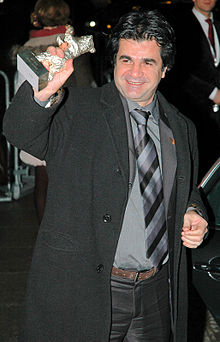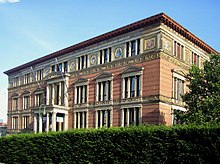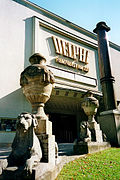How Much Money Do The Berlin Film Festivals Make
 | |
| Location | Berlin, Frg |
|---|---|
| Founded | 1951 |
| Most contempo | 2021 |
| Awards | Golden Bear, Silverish Bear |
| Artistic director | Carlo Chatrian |
| No. of films | 441 (945 screenings) in 2014 |
| Website | berlinale |
The Berlin International Film Festival (German: Internationale Filmfestspiele Berlin), usually chosen the Berlinale, is a film festival held annually in Berlin, Germany.[one] Founded in Westward Berlin in 1951,[2] the festival has been held every February since 1978 and is one of the "Big 3" alongside the Venice Moving-picture show Festival in Italia and the Cannes Film Festival in France.[3] [4] Since 2019, Mariette Rissenbeek has been the festival's executive director; Carlo Chatrian is its artistic director.[5]
With around 300,000 tickets sold and 500,000 admissions each year, it has the largest public omnipresence of any almanac pic festival.[6] Up to 400 films are shown in several sections across cinematic genres. Around twenty films compete for the festival's top awards, called the Gold Bear and several Argent Bears.[6]
The European Film Market place (EFM), a movie trade off-white held simultaneously to the Berlinale, is a major industry meeting for the international film circuit.[seven] The merchandise fair serves distributors, film buyers, producers, financiers and co-production agents. The Berlinale Talents, a calendar week-long series of lectures and workshops, is a gathering of young filmmakers held in partnership with the festival.[viii]
The film festival, EFM, and other satellite events are attended by effectually twenty,000 professionals from over 130 countries every year.[ix] More iv,200 journalists produce media coverage in over 110 countries.[x] At some high-contour characteristic pic premieres held during the festival, motion-picture show stars and celebrities are present and photographed on a red carpeting.[eleven]
History [edit]
During the superlative of the Cold War in 1950, Oscar Martay, a moving-picture show officer of the Information Service Branch of the American High Commissioner for Germany stationed in Berlin, proposed the idea of a motion picture festival in Berlin.[12] [13] [14] [2] The proposal was put through a committee including members of the Senate of Berlin and people from the German film manufacture on ix Oct 1950.[2] Through his efforts and influence, the American armed forces assistants was persuaded to assist and to requite loans for the get-go years of the Berlin International Film Festival, which commenced in June 1951[2] [12] [15] with pic historian Dr. Alfred Bauer as its outset manager, a position he would hold until 1976.[sixteen] Alfred Hitchcock's Rebecca opened the offset festival at the Titiana-Palast in Steglitz on half-dozen June 1951.[17] The first festival ran from 6–17 June[17] with Waldbühne being another festival venue.[17] [ii]
The winners of the starting time awards in 1951 were adamant by a Westward German console, and there were five winners of the Golden Bear, divided past categories and genres.[eighteen] Cinderella, which won the Golden Bear for a Music Picture,[19] likewise won the audience award.[17] The FIAPF (Fédération Internationale des Associations de Producteurs de Films) banned the application of jury prizes at the festival[17] and so between 1952 and 1955, the winners of the Gilt Conduct were determined past the audition members.[twenty] In 1956, FIAPF formally accredited the festival[17] and since then the Gilt Bear has been awarded by an international jury.[twenty]
During the Cold War, a selection of the films were likewise screened in E Berlin.[21]
The 20th edition of the festival in 1970 was cutting curt and awards non issued following controversy over the showing of Michael Verhoeven'southward film o.k..[17] The post-obit year, the festival was reformed and a new International Forum for New Cinema was created.[17]
Bauer was succeeded past picture announcer Wolf Donner in 1976,[22] who gave German films higher priority.[17] After his starting time Berlinale in June 1977, he successfully negotiated the shift of the festival from the June to Feb (22 February – 5 March 1978), a alter which has remained ever since.[23] That festival, the 28th edition, saw the jury accolade the Gilt Acquit to Spain for its contribution to the festival rather than a specific film.[17] The three Spanish films which were screened at the festival and won information technology were curt pic Ascensor directed past Tomás Muñoz and feature films La palabras de Max by Emilio Martínez Lázaro and Las truchas past José Luis García Sánchez.[24] The 1978 festival besides saw the outset of the European Film Market.[17]
Afterwards only three years in the office, Donner was followed past Moritz de Hadeln who held the position from 1980[25] until director Dieter Kosslick took over in 2001.[26]
In 2000, the Theater am Potsdamer Platz, known as the Berlinale Palast during the festival, became the festival's principal venue.[17] Since 2009, Friedrichstadt-Palast has too been used.
In June 2018, information technology was appear that Mariette Rissenbeek would serve equally the new executive managing director alongside artistic director Carlo Chatrian. They assumed their posts after Kosslick'south concluding edition in 2019. Rissenbeek became the starting time woman to lead the Berlinale.[27] [28]
A new Series department, devoted to longform television series, was introduced in 2015.[29]
A shortened 71st festival took place well-nigh in March 2021 due to the COVID-19 pandemic.[30] [31]
Festival plan [edit]

Venues of the festival are spread throughout the cardinal city districts

The Berlinale Palast is the venue for the competition premieres
Equally of 2021[update] the festival is composed of ix unlike sections:[32]
- Competition: characteristic-length films yet to exist released outside their state of origin, which compete for several prizes, including the top Golden Bear for the all-time film and a serial of Argent Bears for acting, writing and production.[33]
- Berlinale Special (a various selection of films, events and people) & Berlinale Serial (for tv series)[29]
- Encounters (established 2020, when Culinary Movie theatre was dropped[34])
- Berlinale Shorts
- Panorama: Queer cinema
- Forum & Forum Expanded: reflections on the medium of film
- Generation: films relating to the younger generations
- Perspektive Deutsches Kino (Perspectives on German Movie theatre)
- Retrospective, Berlinale Classics & Homage
Chief competition jury presidents [edit]
Since 1956, the jury of the Festival has been chaired by an internationally recognized personality of movie house.[35]
| Twelvemonth | President | Profession | Nationality |
|---|---|---|---|
| 1956 | Marcel Carné | Managing director | France |
| 1957 | Jay Carmody | Pic Critic | U.s. |
| 1958 | Frank Capra | Director | United States |
| 1959 | Robert Aldrich | Managing director | United States |
| 1960 | Harold Lloyd | Actor | United states of america |
| 1961 | James Quinn | Film Administrator | United Kingdom |
| 1962 | King Vidor | Managing director | United States |
| 1963 | Wendy Toye | Dancer | United Kingdom |
| 1964 | Anthony Mann | Director, Player | United States |
| 1965 | John Gillett | Picture Critic | United Kingdom |
| 1966 | Pierre Braunberger | Movie Producer | France |
| 1967 | Thorold Dickinson | Director | Great britain |
| 1968 | Luis García Berlanga | Managing director | Spain |
| 1969 | Johannes Schaaf | Director | Deutschland |
| 1970 | George Stevens | Director | United States |
| 1971 | Bjørn Rasmussen | Poet | Denmark |
| 1972 | Eleanor Perry | Screenwriter | United States |
| 1973 | David Robinson | Film Critic | United kingdom of great britain and northern ireland |
| 1974 | Rodolfo Kuhn | Director | Argentina |
| 1975 | Sylvia Syms | Actress | United Kingdom |
| 1976 | Jerzy Kawalerowicz | Director | Poland |
| 1977 | Senta Berger | Extra | Republic of austria |
| 1978 | Patricia Highsmith | Author | United states |
| 1979 | Jörn Donner | Director | Finland |
| 1980 | Ingrid Thulin | Extra | Sweden |
| 1981 | Jutta Brückner | Managing director, Screenwriter | Federal republic of germany |
| 1982 | Joan Fontaine | Extra | The states |
| 1983 | Jeanne Moreau | Actress | France |
| 1984 | Liv Ullmann | Extra | Norway |
| 1985 | Jean Marais | Thespian | France |
| 1986 | Gina Lollobrigida | Actress | Italian republic |
| 1987 | Klaus Maria Brandauer | Actor | Republic of austria |
| 1988 | Guglielmo Biraghi | Moving picture Critic | Italy |
| 1989 | Rolf Liebermann | Composer | Switzerland |
| 1990 | Michael Ballhaus | Cinematographer | Frg |
| 1991 | Volker Schlöndorff | Director, Screenwriter | Germany |
| 1992 | Annie Girardot | Actress | France |
| 1993 | Frank Beyer | Director | Germany |
| 1994 | Jeremy Thomas | Picture show Producer | United Kingdom |
| 1995 | Lia van Leer | Film Developer, Pic Archivist | Israel |
| 1996 | Nikita Mikhalkov | Actor, Director | Russia |
| 1997 | Jack Lang | Politician | France |
| 1998 | Ben Kingsley | Actor | United kingdom |
| 1999 | Ángela Molina | Actress | Kingdom of spain |
| 2000 | Gong Li | Actress | Mainland china |
| 2001 | Bill Mechanic | Motion picture Producer | United States |
| 2002 | Mira Nair | Managing director | Bharat |
| 2003 | Atom Egoyan | Managing director | Canada |
| 2004 | Frances McDormand | Actress | United States |
| 2005 | Roland Emmerich | Managing director | Germany |
| 2006 | Charlotte Rampling | Actress | United kingdom of great britain and northern ireland |
| 2007 | Paul Schrader | Director, Screenwriter | Us |
| 2008 | Costa-Gavras | Director | France |
| 2009 | Tilda Swinton | Actress | United Kingdom |
| 2010 | Werner Herzog | Managing director, Screenwriter | Frg |
| 2011 | Isabella Rossellini | Actress | Italian republic |
| 2012 | Mike Leigh | Managing director, Screenwriter | United kingdom |
| 2013 | Wong Kar-wai | Manager | Hong Kong |
| 2014 | James Schamus | Screenwriter | The states |
| 2015 | Darren Aronofsky | Director, Screenwriter | United States |
| 2016 | Meryl Streep | Actress | United States |
| 2017 | Paul Verhoeven | Manager, Screenwriter | Netherlands |
| 2018 | Tom Tykwer | Director, Screenwriter | Germany |
| 2019 | Juliette Binoche | Actress | France |
| 2020 | Jeremy Irons | Actor | United Kingdom |
| 2022 | Yard. Night Shyamalan | Manager, Screenwriter, Producer | India / Usa |
In 2021, the directors of 6 previous Gold-Conduct-winning films adamant the awards for the Competition of the 71st Berlinale. There was no President of the Jury that yr. The jury members were Mohammad Rasulof, Nadav Lapid, Adina Pintilie, Ildikó Enyedi, Gianfranco Rosi and Jasmila Žbanić.[36]
Awards [edit]



The Aureate Bear (German: Goldener Bär) is the highest prize awarded for the best picture show at the Berlin International Moving-picture show Festival.
Gold Conduct (Goldener Bär)
- Best Motion Picture (since 1951)
- Best Short Moving picture (since 1956)
- Lifetime Achievement (Honorary Golden Comport) (since 1982)[37]
Silver Bear (Silberner Bär)
The Silvery Behave was introduced in 1956 as an award for individual achievements in direction and acting, and for best short film.[ commendation needed ]
In 1965 a special film award for the runner-upwards to the Golden Bear was introduced. Although its official name was the Special Jury Prize from 1965 to 1999, and has been the Jury Grand Prix since 2000, it is commonly known every bit the Silver Bear (only like the awards for individual achievements) as it is regarded as a second identify honour later the Golden Carry.[ citation needed ]
- Thousand Jury Prize (since 1965)
- Silver Bear Jury Prize (since 2021)
- Best Short Moving-picture show (since 1956)
- Best Director (since 1956)
- Silver Bear for Best Leading Performance (since 2021)
- Silver Bear for Best Supporting Performance (since 2021)
- All-time Screenplay (since 2008)
- Silver Carry for Outstanding Creative Contribution (since 2008)
Other awards at the Berlin International Picture Festival
- Panorama Publikumspreis, the Audition Award
- Berlinale Camera, a special honor for services to the Festival
- A Crystal Bear (Gläserner Bär) for the Best Picture in the 14plus section of the Generation Competition
- A Crystal Bear for the All-time Film in the Kplus department of the Generation Contest
- Teddy Award for films with LGBT topics
- Shooting Stars Award for young European acting talent, awarded by European Film Promotion
Former awards at the Berlin International Film Festival
- Best Actor (1956–2020) (replaced by Best Leading and Supporting Operation)
- Best Actress (1956–2020) (replaced by Best Leading and Supporting Performance)
- Alfred Bauer Prize (1987-2020) (replaced past Jury Prize)
- Outstanding Single Achievement (1956–2005)
- Special Artistic Achievement (1956–2007) (replaced by Outstanding Artistic Contribution)
- Film Music (2002–2007)
European Film Market [edit]

The European Film Market place (EFM) is one of three largest picture show markets in the world.[38] Started in 1978,[17] information technology is the business organisation eye during the fourth dimension of the Berlinale. The EFM is the major venue for film producers, buyers, financiers, sales agents, and distributors. Being the first Motion picture Market of the year together with the Marché du Film in Cannes in May and the American Film Market in November, the EFM is one of the three major meetings of the flick industry.
It is a professional trade event, therefore information technology is open to registered industry insiders. In 2020, 971 screenings of 732 registered movies took place with 525 films celebrating their premiere.[39]
The EFM is the follow-up event of the Filmmesse, which was led by Aina Bellis from 1980 to 1987. In 1988, Aina Bellis was succdeeded by Beki Probst. From 2014 to Oct 2020, Matthijs Wouter Knol took over the position. In November 2020, Dennis Ruh became the managing director of the EFM.[xl]
The trade fair provides exhibition infinite for companies presenting their current line-upwards. It organizes over thousand screenings of new films, which accept place at movie theatres around Potsdamer Platz. In 2007, the CinemaxX and CineStar were used to showcase new productions. In 2010, the Astor Picture Lounge showed marketplace screenings in 3 dimensions using digital RealD engineering.
The Berlinale Co-Production Market is a three-day networking platform for producers and financiers, as well as broadcasting and funding representatives who are participating in international co-productions. At the Berlinale Co-Production Market, producers can introduce selected projects and detect co-production partners and/or financiers in i-on-one meetings.
Berlinale Talents [edit]

Commencing in 2003, the Berlinale has partnered with the Berlinale Talents (previously Berlinale Talent Campus), which is a winter school for "upward-and-coming filmmakers" that takes place at the same time equally the festival. The Talent Campus accepts about 250 applicants each year; the attendees come up from around the world, and represent all of the filmmaking professions.[41]
The event runs six days during the Berlinale and features lectures and console discussions with well-known professionals addressing issues in filmmaking. Workshops, excursions, personal tutoring, coaching, and training of participants from unlike fields of piece of work are part of the programme.
The proceedings include presentations by distinguished experts,[42] who have included Park Chan-wook, Frances McDormand, Stephen Frears, Dennis Hopper, Jia Zhangke, Walter Murch, Shah Rukh Khan, Joshua Oppenheimer, Anthony Minghella, Charlotte Rampling, Walter Salles, Ridley Scott, Raoul Peck, Tom Tykwer, Mike Leigh, Tilda Swinton, and Wim Wenders.[ citation needed ] Many of these presentations and lectures are archived, both as video recordings and as transcripts, on the Talents website.[43]
Gallery [edit]
-

Around xx,000 professionals from over 130 countries attend the festival every year
-

-

Kino International is ane of three ticketing centers
-

Bai Ling in 2007
-

The audience has the opportunity to talk over the film with producers and directors after the presentation
-

Conference after a screening
-

The Friedrichstadtpalast became a movie theater location in 2009
-

Delphi Filmpalast
-

See likewise [edit]
- German Cinema
- Picture palace of Europe
- World cinema
- List of films set in Berlin
References [edit]
- ^ China moving-picture show wins pinnacle Berlin accolade Archived 12 September 2017 at the Wayback Machine, BBC News
- ^ a b c d due east "Oscar Martay". Archived from the original on 26 April 2015. Retrieved 25 January 2012.
- ^ Valck, Marijke de; Kredell, Brendan; Loist, Skadi (26 February 2016). Film Festivals: History, Theory, Method, Exercise. ISBN9781317267218. Archived from the original on 18 August 2021. Retrieved 30 October 2020.
- ^ Scott Roxborough (16 February 2020). "Berlin Rebooted: Festival Shuffles Lineup, Aims for Recharged Market". The Hollywood Reporter. Archived from the original on 8 March 2021. Retrieved 26 April 2020.
- ^ "Berlinale 2020: Carlo Chatrian and Mariette Rissenbeek Denote the First Developments". Berlin International Film Festival. 28 March 2019. Archived from the original on 19 December 2019. Retrieved 19 Dec 2019.
- ^ a b Facts and Figures of the Berlinale Archived 27 March 2021 at the Wayback Automobile, berlinale.com
- ^ Berlin Motion picture Festival a market force Archived 10 Feb 2009 at the Wayback Car, Variety, 13. February 2008
- ^ Berlin Talent campus wins hearts Archived 15 April 2012 at the Wayback Car, fest21.com
- ^ 2009 Berlinale Printing release Archived eighteen Feb 2009 at the Wayback Auto, berlinale.de, 18. February 2008
- ^ Kosslick zieht positive Berlinale-Bilanz Archived 17 Feb 2012 at the Wayback Machine(German), PR-inside.com
- ^ Madonna at the Berlinale on YouTube, nineteen. February 2008
- ^ a b The Berlinale, Berlin'due south International Film Festival Archived 16 February 2020 at the Wayback Machine, german-way.com, retrieved 24/7/2016
- ^ Frg, SPIEGEL ONLINE, Hamburg. "sixty Years of Berlinale: A Film Festival of Propaganda, Stars and Scandal". SPIEGEL ONLINE. Archived from the original on 29 July 2020. Retrieved 24 July 2016.
- ^ Wong, Cindy H. (1 January 2011). Flick Festivals: Civilisation, People, and Power on the Global Screen. Rutgers University Printing. ISBN9780813551210. Archived from the original on xix Apr 2021. Retrieved thirty October 2020.
- ^ Berlin International Film Festival Archived 18 July 2020 at the Wayback Automobile, Encyclopædia Britannica, retrieved 24/seven/2016
- ^ "Archive 1951: The ancestry". berlinale.de. Berlinale Printing Function. Archived from the original on 29 June 2018. Retrieved 25 February 2018.
- ^ a b c d e f g h i j chiliad fifty m "Berlinale beginnings". Variety. viii Feb 2012. Archived from the original on 27 July 2020. Retrieved 16 Feb 2020.
- ^ "Juries 1951". Archived from the original on 18 April 2019. Retrieved 16 February 2020.
- ^ "Prizes & Honours 1951". Berlinale. Archived from the original on 23 Dec 2019. Retrieved sixteen Feb 2020.
- ^ a b "- Berlinale – Archive – Almanac Athenaeum – 1952 – Juries". Archived from the original on iv March 2016. Retrieved 16 Feb 2020.
- ^ Myers, Harold (29 June 1960). "Berlin Motion-picture show Fest Unreeling". Multifariousness. p. 5. Retrieved 13 Feb 2021 – via Archive.org.
- ^ "Archive 1977: A promising outset for Wolf Donner". berlinale.de. Berlinale Press Part. Archived from the original on 7 Feb 2018. Retrieved 25 February 2018.
- ^ Langford, Michelle (2012). Directory of World Cinema: Germany. Vol. 9. Bristol, U.k. / Chicago, USA: Intellect. p. thirty. ISBN978-1-84150-465-0. Archived from the original on 22 September 2021. Retrieved thirty Oct 2020.
- ^ "PRIZES & HONOURS 1978". berlinale.de. Archived from the original on 15 October 2013. Retrieved 16 Feb 2020.
- ^ "Archive 1980: Moritz de Hadeln's first twelvemonth: Consequent Renewal". berlinale.de. Berlinale Press Part. Archived from the original on 26 Baronial 2017. Retrieved 25 Feb 2018.
- ^ "Archive 2002: All remains new". berlinale.de. Berlinale Press Function. Archived from the original on 21 February 2017. Retrieved 25 February 2018.
- ^ Barraclough, Leo (22 June 2018). "Mariette Rissenbeek, Carlo Chatrian to Become Co-Chiefs of Berlin Picture show Festival". Variety. Archived from the original on 19 December 2019. Retrieved xix December 2019.
- ^ Mueller, Matt (1 Baronial 2018). "Berlin Film Festival's new co-principal Mariette Rissenbeek on her appointment and future plans". Screen Daily. Archived from the original on 23 December 2019. Retrieved xix Dec 2019.
- ^ a b "Berlinale Special & Berlinale Series". Berlinale. Archived from the original on 11 Nov 2021. Retrieved 11 November 2021.
- ^ "71st International Flick Festival Berlin - Berlinale". visitberlin.de. Archived from the original on 24 October 2020. Retrieved 2 January 2021.
- ^ Keslassy, Elsa (16 December 2020). "Berlin Motion-picture show Festival Gear up to Go Virtual for 71st Edition (EXCLUSIVE)". Variety. Archived from the original on 18 Feb 2021. Retrieved 2 January 2021.
- ^ "Sections & Special Presentations". Berlinale. Archived from the original on 5 November 2021. Retrieved xi November 2021.
- ^ Berlinale.de (2010). "Competition". Archived from the original on 12 February 2010. Retrieved seven February 2010.
- ^ Berlinale.de. "Festival Sections". Archived from the original on xx March 2020. Retrieved ten February 2020.
- ^ "Juries 1956". Archived from the original on 18 April 2019. Retrieved 18 October 2019.
- ^ "Run across the 2021 Berlinale jury". DW.COM. xi Feb 2021. Archived from the original on eleven February 2021. Retrieved 20 Dec 2021.
- ^ "THE HONORARY GOLDEN BEAR". Internationale Filmfestspiele Berlin. Archived from the original on 9 September 2017. Retrieved 10 Dec 2017.
- ^ Kodak Cinema&Television Press Release [ permanent dead link ] , www.kodak.com
- ^ "Facts & Figures - European Flick Market". Archived from the original on 25 Nov 2020. Retrieved nine December 2020.
- ^ "Filmmarkt mit neuer Leitung". Archived from the original on 24 October 2020. Retrieved nine December 2020.
- ^ Berlinale Talents Archived 5 October 2018 at the Wayback Machine, berlinale-talentcampus
- ^ Talent Campus adds to lineup Archived 11 February 2009 at the Wayback Car, Variety
- ^ "Berlinale Talents". Berlinale Talents. Archived from the original on 1 October 2020. Retrieved 3 Jan 2022.
External links [edit]
| | Wikimedia Commons has media related to Berlinale. |
- Official website

- Berlin International Pic Festival at the Net Movie Database
- Berlin Life: An introduction to the Berlin Film Festival
Source: https://en.wikipedia.org/wiki/Berlin_International_Film_Festival
Posted by: washingtonpernedge1971.blogspot.com

0 Response to "How Much Money Do The Berlin Film Festivals Make"
Post a Comment